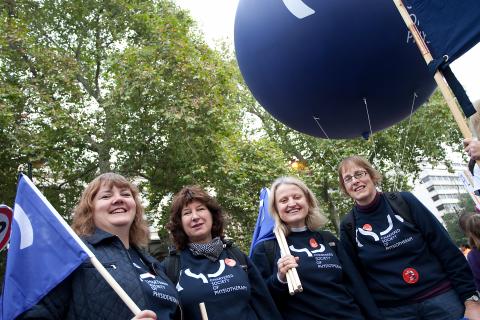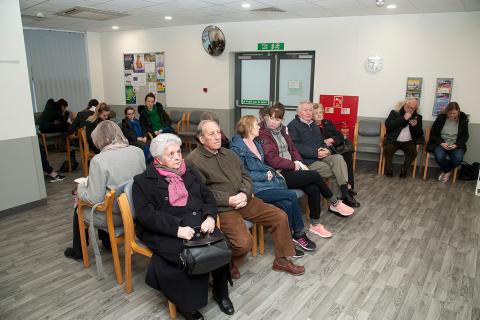Find out more about the training available to you so that you can help people get stronger
Our insight showed professionals wanted training and support to enable strengthening.
Behaviour change advice and training on engaging and motivating people was felt to be especially important for achieving better outcomes.
The links below offer expertly-delivered training to help you develop your skills.
National guidelines
Health Education England and Sport England training on physical activity
- This e-learning course prepares GPs, nurses and other healthcare professionals to champion the benefits of physical activity with their patients
Behaviour change
Why behaviour change is important
- Dr Gill Rawlinson, assistant director of practice and development at the CSP, has just completed a PhD in behaviour change and believes learning skills on the subject should be a high priority for healthcare professionals.
Why mental health awareness is important
- CSP member Brendon Stubbs is a passionate advocate for healthcare professionals increasing their skills and knowledge when it comes to mental health.
- Resource to help healthcare professionals integrate physical activity conversations into routine clinical care
- Physioplus Courses (a free trial account only provides access to certain courses)
RSPH Level 2 Award in Supporting Behaviour Change (Health and Wellbeing)
- This qualification will provide learners with the knowledge, confidence and skills to support individuals who are thinking of making a health behaviour change
- This qualification will provide candidates with the knowledge, understanding and skills to promote the health and wellbeing of individuals, groups and communities
Health Education and Improvement Wales: Motivate 2 Move
- Designed as brief information ‘bites’, the module covers all aspects of physical activity and health
Health Education England: Behaviour Change Development Framework
- The Behaviour Change Development Framework and Toolkit can help you decide what sort of behaviour change training and planning is needed to effectively support people to make positive changes in their lives.
Designing culturally competent services
The Kings Fund: How does the health and care system hear from people and communities?
The creation of a tailored language specific and culturally adapted pain management programme
- NICE: Shared Learning: The creation of a tailored language specific and culturally adapted pain management programme, which was in line with the beliefs, attitudes and understanding of a group of South Asian patients.
The impact of culture on how we deliver care and treat our colleagues
Health coaching
Personalised Care Institiute: Health Coaching - Advancing Your Capabilities (60 mins)
- With the growing interest in the use of a coaching approach in health and social care conversations, this webinar explores some of the key principles in coaching that can be used to deepen your skills and enhance your effectiveness.
Personalised Care Institiute: Core Skills - Personalised Care (1 hour)
- The PCI’s quality-assured Core Skills course provides an introduction to personalised care, helping learners to reflect on their strengths in this area and identify potential challenges they might face. By the end of the course, learners will understand the core capabilities when it comes to building relationships and engaging, enabling and supporting people and they will have experience of relevant and appropriate tools.
Personalised Care Institiute: Personalised Care and Support Planning (1 hour)
- This webinar on Personalised Care and Support Planning (PCSP) outlines the PCSP process and demonstrates the importance of focusing on the person ahead of the process. It identifies how a meaningful conversation with an individual to discover what is important to them is the key to excellent PCSP, with the written care plan being simply an output of that - albeit a very important one.
Shared decision making
Personalised Care Institiute: Personalised Care and Support Planning (45 mins)
- Good Personalised Care and Support Planning (PCSP) is about having a different kind of conversation about health and care, focusing on what matters to the person as well as their clinical and support needs to develop a single plan that is owned by the individual and accessible to those supporting them. The PCIs quality-assured PCSP module uncovers the key stages of a personalised planning process and the criteria for a good PCSP, helping learners to identify some of the changes they need to make in order for planning to be more personalised.
Personalised Care Institiute: Shared Decision Making (30 mins)
- The PCI’s peer-reviewed Shared Decision Making (SDM) module walks through the process by which health and care professionals can work together with people to help them decide on the right choices for them. Learners will get to know the moral and regulatory principles that underpin SDM and, by the end of the course, be able to start the process of implementing SDM in day-to-day practice.
Personalised Care Institiute: Shared Decision Making (SDM) Masterclass (90 mins)
- Shared decision making is a key component of personalised care, and all healthcare professionals should be able to use this approach in practice. This highly interactive PCI Masterclass brings together UK expertise in shared decision making and state of the art training resources to support healthcare professionals to develop their skills. It also includes updates on important new developments such as the GMC guidance on decision making and consent and NICE guidance on shared decision making.
Understanding health inequities
NHS England: Equality and Health Inequalities Hub
- The Hub is designed to provide support and assistance to the NHS, and beyond, in promoting equality and tackling health inequalities for all patients, communities and the NHS workforce. It brings together equality and health inequalities resources and provides useful links and information for the sharing of good practice.
- Physiotherapists, like all healthcare professionals, have a responsibility to reduce health inequities, says Jennifer Valerie Motlaleselelo
- The health inequality issues facing adults with a learning disability.
- Knowing our population is the first step towards being able to improve health inequity, which can in turn reduce health inequality optimising patients’ chances to achieve their best health outcomes.
CSP response to report from the NHS Race and Health Observatory
- Racism, racial discrimination and barriers to accessing healthcare have led to huge health inequalities for Black, Asian and minority ethnic people in England, according to a review commissioned by the NHS Race and Health Observatory.
Practical guide for managing appointments with patients who have a learning disability
Mapping your local need
Understanding and adapting to local need
- Connect Health talk about the steps they take to map their area, engage with their communities and adapt services to meet their patients’ needs.



